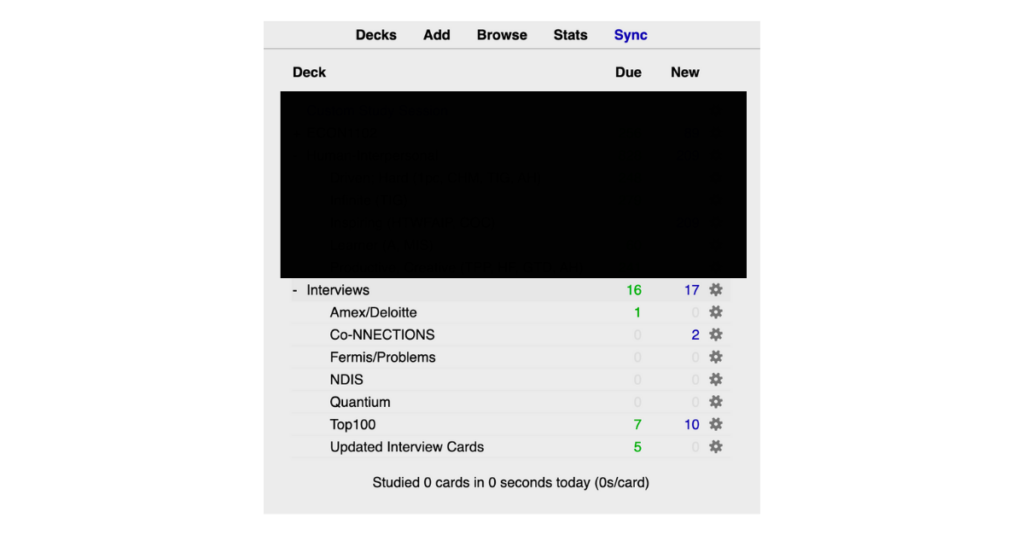My THREE GO-TO interview tips – in detail
Posted on: January 22, 2023
Post Category: Professional Development

If you are a current Uni student, you may have probably seen heaps of YouTube videos and attended workshops, hosted by some of the largest companies, about this… interview tips and tricks.
They present you with, more or less, the same thing – researching the organisation, the STAR technique, having good questions to ask at the end of the interview, etc.
So… what makes this blog post different? In this post, I will be sharing some of my quirks when it comes to interview preparation – my three go-to “tips and tricks” for interviews. Some of these tips not only helped me during interviews but also other stages of the application process, if they were present.
Read on to find out more! I hope this post presents some new information, and that you can, at least, take away some tips to adapt.
1. Get deeper insights about the role through an informational interview.
Well before doing my interview, I try to book in a chat with someone who is working, or has worked, in the role/team I am applying for – to ask questions about their work and experience. These chats always present a unique opportunity for me to take notes, get ahead in organisational research, learn about the key skills/competencies, and get deeper insights into what questions could be asked during my interview.
Ultimately, having a chat like this gives me a better understanding of the business and their current initiatives/projects, and it helps me develop more polished responses to interview questions. Sometimes, I also get to learn more about the entire application process (and the different stages). This allows me to prepare strategically and focus on the most important things for my performance.
Setting up a time to have an informational interview has always helped me save time when it came to internship or graduate applications. Whenever I become demotivated to do my own organisational research online, setting up a meeting time with someone forces me to rock up on time and get it done.
From my personal experience, I’d say if it weren’t for me reaching out to people and asking for a short chat, I probably would not have received most of the internship and graduate offers I got.
Granted, this tip does not guarantee an offer or progression to the next stage in the recruitment process, but I found it helpful for building my own knowledge and my network at least – and you never know when those learnings and connections might come in handy.
2. Use flashcards in preparation for your interview.
During the interview, you will be required to think on the spot and, oftentimes, recall examples from your own personal and professional experiences. Flashcards helped me do this quickly.
I use a software called ANKI to create flashcard decks for my interviews, and these decks primarily consist of simple front-and-back cards. On the front of the card, I have an interview question, and on the back of the card, I have a few trigger words and sentences or even fully fleshed-out responses that follow the STAR framework. Going through these flashcards quickly helped me improve my recall, and this eventually helped me be ready for interview questions within a few hours.
However, the downside of this tip is that you will have to create the flashcards yourself. Early on, it can be very time-consuming creating the cards, particularly when it comes to devising STAR responses and trigger words for interview questions. But it gets easier the more cards you make. Later on, you will realise that, for many interview questions that get thrown your way, you could easily use the same experience or response you’ve used for another question.
When preparing for interviews, what I found helpful was to reframe points from the job description into potential interview questions that could be asked. And even after completing interviews, I would write down any questions I haven’t come across before. I would then make flashcards out of these questions (with thought-out responses), and they would help me prepare for the next one.

Another important thing to remember is that you should never focus on quoting prewritten responses. It may hinder your non-verbal communication, and this will make it harder for the interviewer to engage with you. This will be explained further.
3. Relax, and take your time – especially when you get stuck.
At least an hour before my interview… I’d put my flashcards away and try to be present. This is because I want to go into the interview not being too TOO concerned about what I might say – relaxed, with an open mind.
This doesn’t mean I forget about my responses. Yes, when it comes to interviews, your responses are important, but how you communicate non-verbally and engage with the interviewer is more important.
During one of the courses I took at University, there was a presentation workshop held by a coach for MBA students. And this idea from one of her slides stuck with me ever since: the 7-38-55 rule.
“The 7-38-55 rule indicates that only 7% of all communication is done through verbal communication, whereas the nonverbal component of our daily communication, such as the tonality of our voice and body language, make up 38% and 55% respectively.”
This was a concept shared by a researcher of body language, named Albert Mehrabian.
Since 93% of your communication is non-verbal and 7% of your communication is verbal, it is (13 times) more consequential that you focus on being relaxed and building rapport with the interviewer than to focus on what you are going to say and when. So, listen to some music – and do anything you need to shake away the nerves.
And in the case you do get stuck with a question, don’t be afraid to ask for time to think about it.
And these were my three go-to interview tips – in detail!
- Get deeper insights about the role through an informational interview.
- Use flashcards in preparation of your interview.
- Relax, and take your time – especially when you get stuck.
Here are some of my other posts on interviews and assessment centres:
- An Introductory Guide to Interviews – for Students
- NINE interview tips for Uni students
- Learn about the Assessment Centre and how to succeed – with Tony Weightman
- Quick and practical preparation advice for interviews and assessment centres
- An intro to UNSW student society subcommittee applications and interviews
You can also see more of my posts at jason-khu.com, follow me on LinkedIn, or see the rest of my ‘Uni for students’ guide here.

About the author
Jason Khu is the creator of Data & Development Deep Dives and currently a Data Analyst at Quantium.